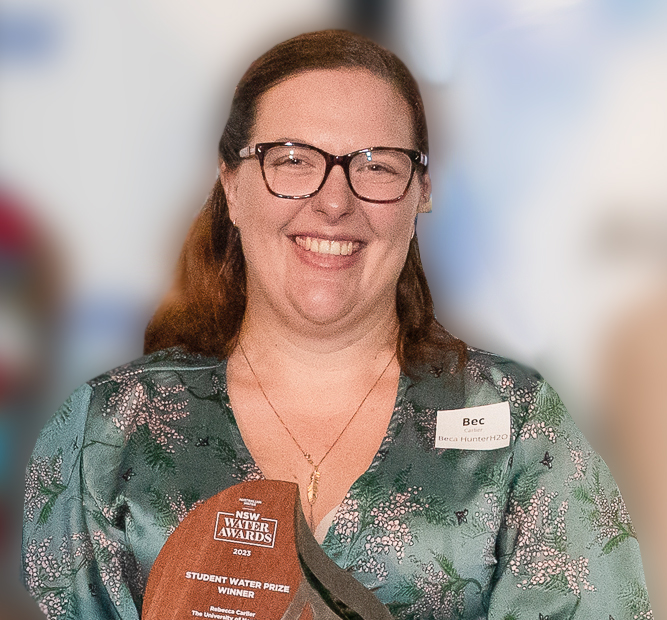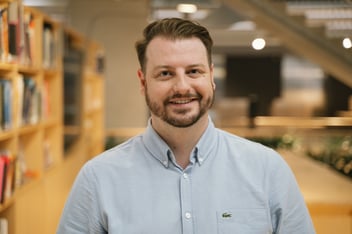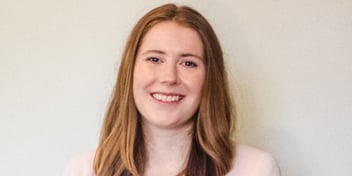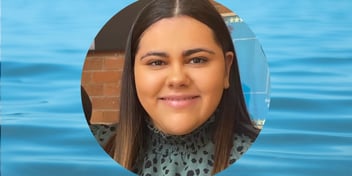Spotlight on a Regional YWP: Rebecca Carlier

Rebecca Carlier - Planning Engineer at Beca Hunter H2O
Regional AWA members have always been important to delivering water and sewage services across the country. This Spotlight article is part of a series highlighting the experiences and contributions our regional members make to their industry and communities. In this interview we learn about Rebecca Carlier, Planning Engineer at Beca Hunter H2O.
Q: Tell us a little about yourself and the work you do.
I’m a multi tasker, part time PhD student, part-time working and a Mum. I work at Beca Hunter H2O and have previously worked at Midcoast Council. Both employers were flexible about studying, which has really helped support my studies and family life. This is really beneficial has I have been able to integrate lessons learnt into my work and studies, but juggling between the two can sometimes be difficult.
I’m currently doing a PhD at the University of Newcastle, looking at the integration of ecological response feedbacks into water resource optimisation software. This project advances decision support for strategic planners and water managers. The integration of river basin and ecological models within a decision support framework provides a platform to assess and compare long-term ecological response to management strategies with consideration to climate variability, altered flow conditions and ecological sustainability. This will provide support for decisions with the allocation of water throughout the region as well as the use of allocated environmental water to optimise ecological outcomes.
At Beca Hunter H2O, I work as a planning engineer analysing the curlier problems water utilities faced - problems that require analysing large amounts of data, integrating this data into viable solutions and deep diving into problems that require a more in depth analysis. For example, I’ve been working on investigating the development of a framework into reducing the risk of pipe burst failure. This includes analysing the risk of failure on a pipe based on the likelihood and consequence of failure, and investigating how the failure can be avoided. I also work on Integrated Water Cycle Management for local water utilities, and will be focusing on this a little more moving forward.
Q: What brought you to work in the Water Industry?
I had an interest in water from a young age. I joined my high school water watch team, and was lucky to have a high school teacher who mentored me and pushed me to follow my interest in the water industry. It also meant that I saw a career in the water industry at a young age, and I knew that I wanted to be a water engineer.
At university I amalso fortunate to have my PhD supervisor (George Kuczera) who encouraged me to follow my passions and do my PhD.
Both these people were passionate about the water industry, and were able to develop the same passion in me and follow my career aspirations. Having strong mentors who helped push me follow my passion is what helped me get to where I am.
Q: What is the best thing about working in a regional area?
I’ve mostly worked in regional areas, first at MidCoast Council and then at Beca Hunter H2O. Most of the clients I work with are also regionally based so I’m often working with or for regional water utilities. My PhD studies have looked at regional environments, such as the Macquarie Marshes out in central NSW. What links regional areas is that every problem and every solution is unique to that region/area. Approaching every problem the same way will result in poor solutions and the loss of trust with those communities. So we have to look at how we can provide the necessary support, what that actually looks like and how can we get the best outcome. The driving factor is the impact you can make on a community especially in regional areas.
I have also lived regionally, living in Buladellah while I was at MidCoast Council followed by Newcastle while I’ve been at Beca Hunter H2O. I’m grateful to an extent that I don’t live in a major metropolitan area, as I find regional living more relaxing.
Q: What is the most difficult thing about working in a regional area?
I find that this question is the hardest one. I think the most difficult thing with regional areas is the importance of developing those relationships with those communities. You need to explain what a solution might be to a problem they’re having, without just providing ‘ready-made solutions’. You also need to ensure they’re on board and supportive of the proposed solution. Communication is key to ensuring you provide the right solutions, and speaking to the community helps to avoid this. Especially in instances where there are problems that the data available doesn’t highlight.
Distance can be an issue, but there are little things about regional living that I can appreciate. When I worked at MidCoast Council I would travel about an hour a day to get to work. But sometimes when I left for work in the morning, at a certain time the sun would hit the grass at a certain angle and reflect the dew on the grass, making it appear pink. It was a beautiful sight and made me appreciate regional living. Plus with audio books, long drives are much more enjoyable.
Q: What moment/achievement are you most proud of in your professional career?
Doing my PhD has been my most proud moment so far. It has been a long slog and I still have a little bit to go, but I’m proud of the work I’ve done. It’s massive, and a lot of late nights and weekends have gone into it. Once I’ve completed it, I can be proud of it, and I think it has the potential to show the impact that we can have on the environment and how we have changed the operation of that ecosystem. In the end, we can look at where the environment is now, and how we can improve it moving forward.
Q: If you could go back five years, what advice would you give yourself?
I have a couple of things that I would say. Firstly, you will have big years and small years. The small years will give you the breathing room to prepare for the big years and help you get through them. That might mean one step back to take three steps forward.
I would also note that you need to manage that as an expectation. That includes from a mental health perspective – it’s important to check in on yourself and ensure you don’t dip too much. We expect to achieve all these things, but the first thing to drop generally is your mental health. With the past couple of years and the Covid pandemic burnout has been pretty prevalent. I myself have had a few bad years where my mental health dropped, and I’ve had to focus to get it back. You always perform at your best when your mental health is in check.
Regional YWP’s are making a difference in their local areas and the industry as a whole. If you are a YWP living, working, or studying in a regional area and would like to get involved or share your story, please contact your YWP Committee Regional Representatives:
Trevor Sultana | Trevor.Sultana@outlook.com
Brendan Dagg | Brendan.Dagg@ghd.com



